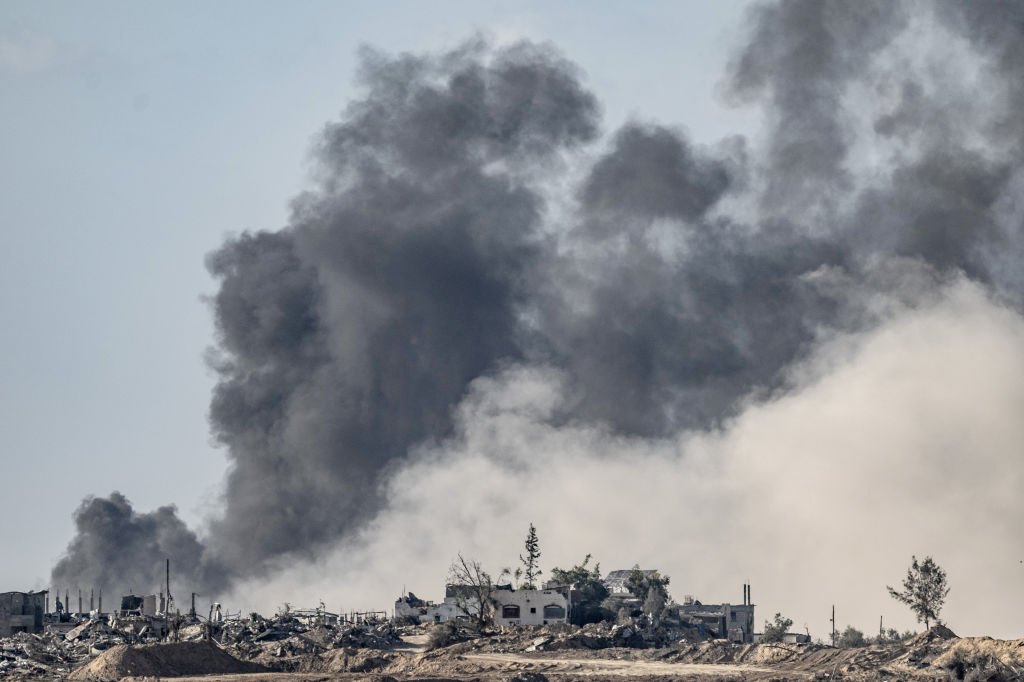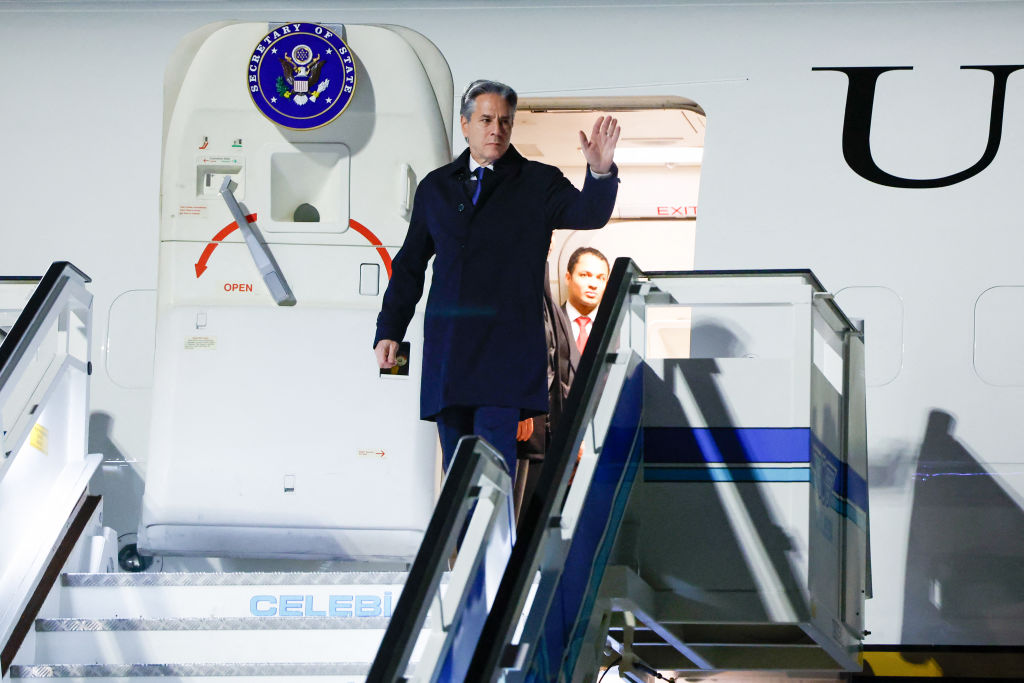
The current humanitarian and political disaster unfolding in Israel and the Palestinian territories requires immediate international intervention. This intervention will not succeed unless it also aims to break the endless cycle of violence and ensuring long-term regional stability. After decades of conflict, it is clear the parties are unable to reach a resolution without help. The Oslo Peace Process initiated in 1993 is definitively over. What is required now is a new paradigm, one which will resolve the Palestinian-Israeli conflict and ensure stability in the Middle East once and for all.
As the U.S. leads a multilateral combat force into the Red Sea to protect international shipping lanes, I propose instead that it should act decisively to resolve the growing regional conflict at its root, instead of deepening its involvement in the quagmire of that conflict’s symptoms. To do so, the U.S. should lead a multilateral peace-keeping force, with regional Arab and international allies, to physically intervene in Gaza and the West Bank and end hostilities within a political framework which will resolve the Arab-Israeli conflict. While this may sound far-fetched, it is the only realistic solution to a long-standing and intractable problem, and it would be in U.S. interests.
The need for an immediate ceasefire is clear, as is the urgent and dire need for international humanitarian assistance and reconstruction in Gaza, whatever the political context. However, a humanitarian force in Gaza would not be able to achieve even limited goals operating under Israeli auspices, as it will be perceived as enforcing Israeli occupation, and will face resistance by the Palestinians. So any international intervention will need a broader legal framework in which to operate, and is bound to be involved in security aspects as well as humanitarian ones.
With this in mind, the intervention can and should have the aim of both dealing with the immediate humanitarian crisis and of resolving the conflict once and for all. In order to do so, it must be (1) U.S.-led, inclusive of regional and international allies; (2) based on a clear international legal framework and political outcome; (3) strictly limited in time, e.g., 3 years; (4) impartial, with the aim of protecting both Israeli and Palestinian civilians across the occupied territories while (5) organizing the delivery of urgent humanitarian assistance and aid in Gaza, the return of hostages and initiating the process of reconstruction and (6) the context for organizing elections leading to a final peace agreement.
Read More: Biden Must Push Netanyahu
Having the multilateral force be U.S.-led will achieve three objectives: 1. It will make the intervention more palatable to Israel enhancing its chances of success; 2. It will rehabilitate the U.S. in the Arab and Islamic world, and counteract a growing perception of it as an enemy, one which is funding and arming a military occupation force committing war crimes; and 3. It will protect U.S. interests both in terms of supporting Israel’s security and at a regional and international level.
The U.S. has always been Israel’s strongest ally. This intervention should be viewed as exercising that support to its fullest, by decisively implementing a realistic, long-term strategy to ensure Israel’s security, instead of short-term reactionism that perpetuates the outbursts of violence. Only the U.S. has the leverage and relationships to convince Israel of this.

A decisive physical intervention would also be strongly in the U.S. interest: leading this multilateral, multinational force would firmly demonstrate the U.S.’s global leadership, especially in democracy and human rights. It would put the U.S. on the right side of international “values and morals”, thereby increasing its soft power. It would prevent Russia and China from expanding their influence in the Middle East. It would support Middle Eastern allies. And it would achieve the elusive goal of peace in the Middle East and a safe and secure future for Israel within it.
Amid criticism of the U.S. withdrawal from Afghanistan and accusations of softening support for Ukraine, this strategic move would also reaffirm the U.S. commitment to take concrete action to support both its allies and the world’s most vulnerable, with minimal risk to U.S. personnel. In fact, it would reduce risk to U.S. personnel regionally by helping to defuse terrorist threats.
The participation of regional Arab allies in the multilateral force is also crucial to the effectiveness and legitimacy of the initiative. It will build trust with Palestinians and Israelis, and help stabilize the participating countries as well, by showing decisive action to end the war, provide aid and assistance and protect civilians. Psychologically, the impact of their involvement cannot be overstated: it will be the end of Israel’s isolation. Coupled with the end of the occupation which it heralds, the intervention itself will be the harbinger of peace.
The legal framework and defined outcome are necessary for two reasons. First, in order to avoid a repeat of the Oslo process. While it is too early now to define the details of the final agreement, the framework provided by the Arab Peace Initiative—a widely-accepted, U.N.-based formula for regional peace and the full acceptance of Israel in return for ending the occupation of Palestinian territories and the return of refugees—should be sufficient to ensure an equitable agreement is reached between Israelis and Palestinians. It will also encourage the participation of regional Arab allies in the process, which will be to the benefit of all parties.
The clear legal backdrop will also play an essential role in building hope and support among the populations on both sides for the process itself and for the peaceful outcome at its end. It will provide a context to develop a national electoral process for the Palestinians at the end of the first year, and the framework for the national debates that need to take place within and amongst Israelis and Palestinians themselves.
It is, of course, impossible to guarantee the outcome of a democratic process—but there is no other option. While Hamas, or an affiliated political party, may well—and should be permitted to—run in these elections, they will have little to offer to voters. I believe people are more likely to choose a guaranteed equitable peace over continued conflict. Also, poll results over the past years indicate that Palestinians are still more likely to vote for a secular and free state, instead of a religious one with all its restrictions. Most analysts view the Hamas majority achieved in the 2006 elections as principally a rejection of an endless and hopeless peace process and a corrupt leadership. A new Palestinian leadership would also be free of the odor of corruption and incompetence that undermines the Palestinian Authority today.
The three-year timeline will guarantee a clear end point: an agreement must be reached by then, at which point the multilateral forces can leave. The end point is important for Israelis and Palestinians, a definite horizon after which life can begin to be normal. It is also important for the countries participating in the multilateral force, who will thereby be committing to a strictly time-limited operation.
The intervention must also operate impartially to protect civilians across all of the occupied territories, and not only in Gaza. Although Israel portrays its current attack on Gaza as a war against Hamas, from the Palestinian and broader regional perspective this is the latest iteration of a war against the Palestinian people (and Arab peoples) which never ended. Palestinians in the West Bank (including East Jerusalem) are also subjected to daily violence by extremist settlers and the Israeli army, which needs to be stopped. Guaranteeing the human security of civilians across the occupied territories will also ensure the acceptance and positive reception of the multilateral force by local populations.
As it minimizes friction between, e.g., settlers and villagers in the West Bank, and protects Israeli civilians from potential terrorist attacks, the multilateral force will also create a sense of calm and safety. It will increase the sense of security of the Israelis. It will defuse tensions, and organically engender the development of pro-peace sentiment. This will build a legitimate, popular basis for the peace accords and positive momentum on which to build into the future.
There will most likely be resistance to this proposal by groups on both sides. That does not make it any less necessary or urgent. Indeed, the main argument supporting this intervention is that the two sides are unable to make peace without it. There will most likely also be extremists who reject the idea of peace, and splinter groups who will do their utmost to derail this process (as there were in Northern Ireland, when the Provisional IRA rejected the peace agreements). They cannot be allowed to undermine the future of the majority of the peoples on both sides.
The current Israeli government may reject an international intervention as a violation of Israeli sovereignty. However, that sovereignty does not extend to the occupied territories, where the multilateral force will operate. Israel may also argue that it refuses to hand off the responsibility for its security to a multilateral force, claiming it can only rely on itself. But Israel’s massive security failures of October 7 already undermines that assertion.
Moreover, Israel already relies on others for its security. It essentially subcontracts its security in the West Bank to the Palestinian Authority, and it has often noted the success and importance of that relationship in keeping Israel safe (and indeed, that with other regional partners such as Jordan and Egypt). And, as has been made painfully clear in its current war on Gaza, without bottomless U.S. backing, Israel needs outside arms and ammunition to defend itself.
It is also clear that Israel’s entire security paradigm needs to shift. It is not sufficient for it to rely on walls, fences, technology, or military superiority, again as evidenced by the attacks of October 7. What Israel needs is the long-term security that comes from peace with the Palestinians and regional acceptance in the Middle East; and not only by its governments, but also by its peoples.
Moreover, Israel is far from the only country whose security is at stake, and it must not have the only say. The security of the region as a whole, and of U.S. and other interests there, must also be taken into account. The populations of Egypt, Jordan, Morocco and elsewhere—not only in Yemen —are seething in anger and solidarity with Palestinians. This regional instability is already endangering friendly governments, Israel itself, and U.S. interests and forces in the area. Moreover, Israel has already announced it is in a long-term multi-front war: it has recently likely assassinated a senior Iranian general in Syria, and is threatening to attack Lebanon.
No other Middle East “peace” plan or option under discussion—e.g., without the overarching political framework, or without regional allies, or focusing purely on Gaza—has the required legitimacy to succeed. Although this U.S.-led multilateral peace-keeping force involves committing U.S. troops and funds to yet another operation in the Middle East, which many will find difficult to accept, this action is crucial for a long-term strategic victory for the U.S. across the region. It is better and safer to commit to U.S. troops to this, than to commit further troops to fighting in the Red Sea and beyond. It will be cheaper for the U.S. taxpayer than providing continuous funding and military support to an Israel at war for the foreseeable future. It will bring peace and security to Israelis and Palestinians, the regional integration and acceptance of both Israel and the U.S., and all the positive political and economic dividends that follow.
More Must-Reads from TIME
- Inside Elon Musk’s War on Washington
- Meet the 2025 Women of the Year
- The Harsh Truth About Disability Inclusion
- Why Do More Young Adults Have Cancer?
- Colman Domingo Leads With Radical Love
- How to Get Better at Doing Things Alone
- Cecily Strong on Goober the Clown
- Column: The Rise of America’s Broligarchy
Contact us at letters@time.com